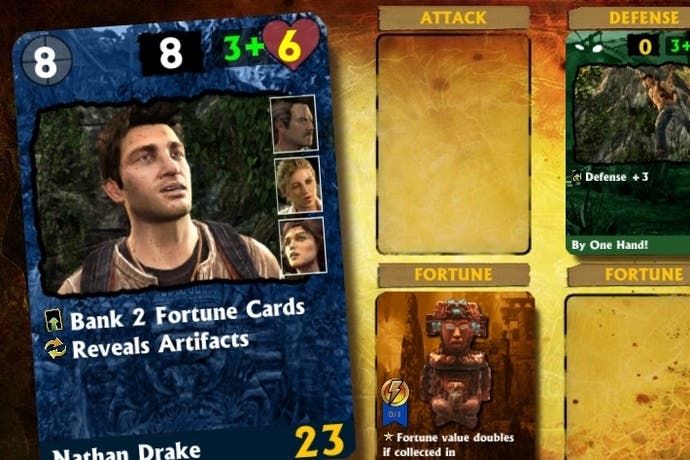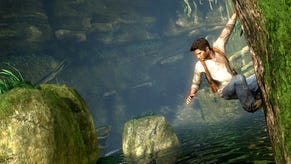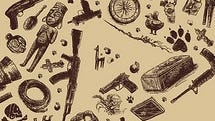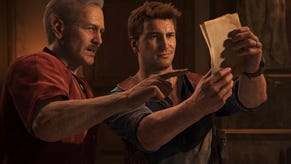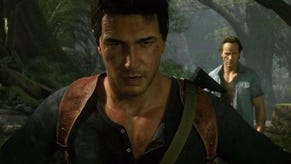Uncharted: Fight for Fortune review
Gaming's favourite chancer gets carded.
Fight for Fortune is the Vita's Uncharted card battling game. Every one of the series' characters, from Drake to Francis Drake to Draza, battles over treasure using tropes from the series ("CAVE IN!", "Sully's Sea Plane"), all in card form. How does this end up? Well, (full warning, this review's about to peak) it's a little thin.
I'll start by telling you how it works, though don't expect anything familiar. I'm about to slap you upside the head with some very obtuse card mechanics, so make sure your tongue isn't resting between your teeth. Maybe close your mouth entirely.
You and your (most likely AI) opponent are dealt a range of 12 character cards, divided into Heroes, Villains and Mercenaries. You're going to be playing these cards into your choice of five slots, with the aim of using them to chisel your nebulous opponent down to zero health.
Your five slots are opposed by your opponent's five slots. Character cards can only do damage to your opponent if they're unopposed, is the thing, so you're playing characters both to attack your opponent and block their characters. If he saves up and drops someone vicious, like Roman or Sully? Maybe you want to block them with some cannon fodder, like, er, Tibetan Villagers.
This is Phase 1. Once you're done here the screen slides to the right, like a sushi conveyor belt, to reveal Phase 2, in which you draw a treasure card at random.
Bear with me. This treasure card might be good! Or it might be crap. Either way, you can either "bank" it for a paltry five "Fortune Points" or slip it under one of the characters you've played, with the hope that a character's ability will let you sell the card for its full Fortune Point value later.
What are Fortune Points for? Glad you asked! The screen slides to the right again to Phase 3, in which we arrive at your hand of six Resource Cards, which can be anything from weapons to vehicles to just getting behind cover. They are exclusively awesome, letting you buff your characters or noisily bump off those of your opponents, to an apocalyptic detonation of everyone's economy.
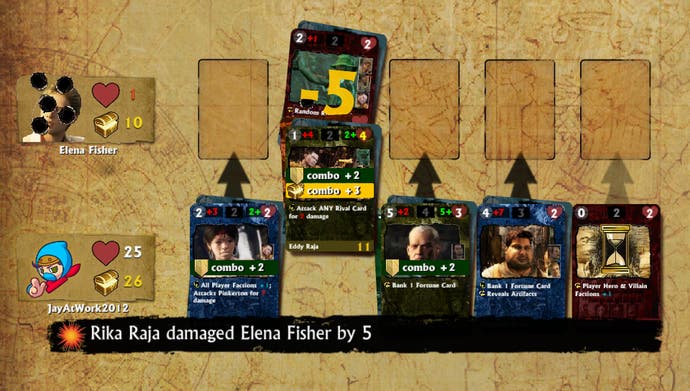
"Buhhh i ii un," you cry. What was that, sorry? You can open your mouth now. "But is it fun?" you say again.
Well, following a very slow start in which you pick your way past the beginner matches, having played a tutorial that doesn't quite explain the puzzle of the game, it's actually quite moreish.
Winning is fun, as you watch your array of inexplicably paired monsters, historical figures and wisecracking treasure hunters wobble through their minimalist attack animations, pummelling holes in your opponent's defence. More importantly, getting slapped around by a vicious AI is entertaining in a very different way. It speaks well of Fight for Fortune's design as a card game that there always feels like a way out. Perhaps if you combine this card with... no. Oh, but if you use this to block that, then power it up with that! Yeah!
About four hours in, I was tumbling from thematic opponent to thematic opponent, having a jolly time. I'm not sure I've ever had a jolly time before, but this definitely felt like one. The TV was on, I was enjoying a range of objectives in my matches and I was enjoying unlocking new cards with each 15-minute victory.
At the time, my only complaint was that it didn't feel like an Uncharted card game. However you choose to define the series, whether by its glossy environments, summer blockbuster characters, ridiculous stunts, plot twists, climbing, shooting or - my personal choice - that awesome "damp clothes" graphical effect, it's absent in Fight for Fortune. Instead, what you're getting is something that could be reskinned as a license for any action game ever made.
Then I hit hour five, at which point I had a slightly bigger complaint, because I had no levels left. I'd subdued the game's hardest level without thinking about it. And while five hours isn't unreasonable for a five-dollar game, I'd spent that entire time waiting for the game to get going.
Enter Fight for Fortune's two three-dollar expansions themed around Uncharted 2 and 3, each of which hold levels that are slightly harder - but still not hard enough. I felt like someone casting around for something hard enough to bang in a nail, except the nail was my increasingly aimless brain.
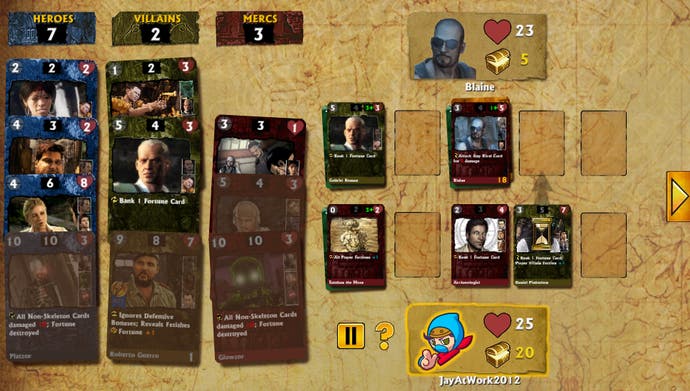
The solution to that, in turn, would be multiplayer, except this commits its very own offence. Every achievement you unlock in Golden Abyss, your actual Vita Uncharted game, takes one card from Fight for Fortune and powers it up into a riotously overpowered variant.
You're a smart person, even if we did have that mishap with your mouth earlier. I'll let you guess precisely how much fun it is to go online and be violently dismantled by someone who's caned Golden Abyss when you don't own it.
So, Fight for Fortune isn't particularly deep, despite this being how card games define themselves. The deck-building only lets you tinker with which characters you bring into skirmish and multiplayer, and within the matches themselves your options are broad enough to keep you engaged, but tight enough that you'll end up simply "solving" the game's AI matches. Especially so because, since you don't have the option to mulligan (discard bum hands), occasionally lady luck ends up swallowing entire aspects of the game. Gulp! You can no longer create character combos. Mmph! You can't sell treasure any more.
So there you have it. A moreish snack of a game that's a bit thin, a bit lacking in nourishment. It's a five-hour bag of crisps for your PlayStation Vita. Which doesn't sound that bad, come to think of it. And you won't think it's that bad, as the game leads you hand over hand from curious decision to curious decision. You just run the risk of not remembering a moment of it. The only important decision you'll be making, then, is whether that matters in the slightest.
